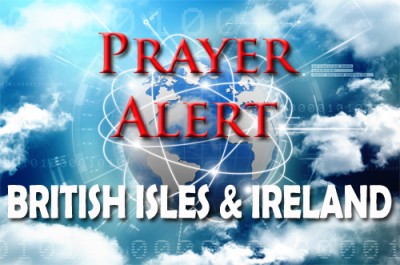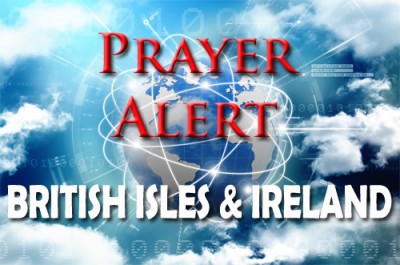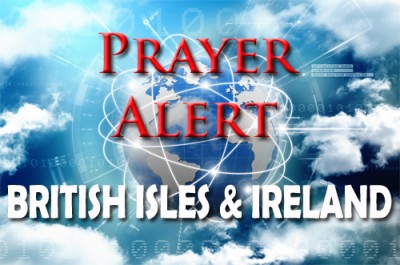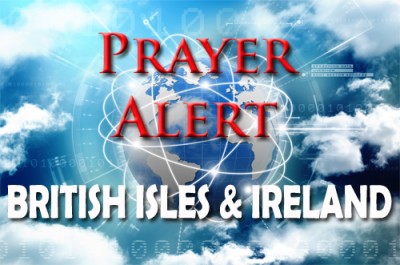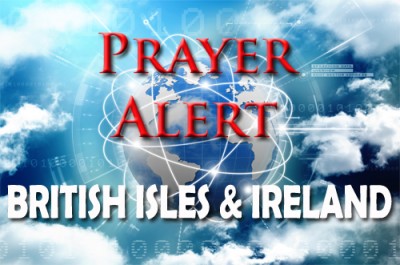No home for persecuted Pakistani Christians
29 Jan 2016At present there are only a handful of Pakistani lawyers in the UK, and many Pakistani Christians desperately need shelter and refuge in Britain. The suffering of Pakistan’s Christian minority is well documented, but people are not aware of the tragic way in which many of those who muster up the courage to seek refuge in the West are turned away at the door. There is a need for the Pakistani church in Britain to work in tandem with the church in Pakistan to ensure that members of their flock know in advance what support is available for them from the church and where they can turn upon arrival in a foreign and bewildering land. For many, their poor English makes receiving guidance from a British advisor a daunting challenge. Even if they are able to find a fellow Pakistani to assist them, the advisors tend to be Muslims and so the problem of distrust arises.
Scotland: Trypraying
29 Jan 2016Last week we highlighted Trypraying’s launch of ‘forty days of prayer’ for Lent, and Parliamentary Prayer Scotland’s promotion of a forty-day prayer call prior to the Holyrood elections on 5 May. We continue, with Prayer for Scotland, to pray for David Hill and the Trypraying team as they seek to finalise all the details for Lent, the March bus adverts and the ‘Use it and Lose it’ booklet campaign. Pray for the money needed to place adverts on buses throughout Scotland: may it miraculously come in. Pray that the information meetings for leaders in Edinburgh, Glasgow and Aberdeen in late January and the launch event on 10 February in Edinburgh will be successful. Pray that many in Scotland will grasp the vision for praying for their family and friends, themselves and the nation through Lent, and that many will take the Trypraying booklet and use it to share their faith.
Libraries face closure around the UK. A week of events and a nationwide celebration of libraries on 6 February is supported by campaigners and writers highlighting the importance of the public service. Bestselling author Ann Cleeves has urged people to go out and join their local library next week. She said that she wouldn’t have been a writer without a library and that lots of authors will tell you the same thing. There should be equal access to books, information and facts for everybody. Campaigners will lobby Parliament on 9 February calling for ‘a port of call’ for books, local information, human contact, internet access, newspapers and magazines; a safe and quiet environment, help with form-filling, advice, and the countless other little things that all add up to bigger things. More than 100 libraries closed last year; the public library service is in the middle of its worst-ever crisis.
Mali: Swiss nun kidnapped by British militant?
29 Jan 2016A video released by al-Qaeda features a militant with a British accent claiming responsibility for kidnapping Swiss nun Beatrice Stockly in Mali. She was taken on 7 January when armed militants surrounded her home in Timbuktu. Beatrice is accused of ‘declaring war against Islam’. A man with a British accent said, ‘We, al-Qaeda in the Islamic Maghreb, declare our responsibility for the kidnapping of this Christianising kaffir Beatrice Stockly, who by her work drove out many from the fold of Islam by seducing them with crumbs of this worldly life.’ The sister was previously kidnapped in 2012 but broke her conditions of release by refusing to stop preaching the gospel. Beatrice appears in the video wearing a hijab and next to a flag. The group also claimed responsibility for the terror attacks two weeks ago on a hotel and restaurant in Burkina Faso when thirty people were killed.
Disability benefit cuts
29 Jan 2016The Government has been defeated in the House of Lords over plans to cut the benefits of people with illness and disabilities. Ministers wanted to cut Employment Support Allowance (ESA) by £30 a week to spur new claimants to return to work. But Labour, Lib Dem and independent peers joined forces to block the move, arguing it would make it harder for those affected to pay for the support that might allow them to find work. The Government may try to overturn this decision at a later date in the House of Commons. Mencap's Rob Holland, who is chair of the Disability Benefits Commission, said: ‘The Government wants to get more disabled people into work, but as a sector we have warned that cutting ESA and Universal Credit will directly undermine that commitment, whilst pushing disabled people further from work and closer to or into poverty.’
Older people are being 'let down by NHS’
29 Jan 2016English and Welsh health leaders say, ‘Older people in need of urgent help are being failed by the NHS’. Too many over-65s end up in Accident and Emergency unnecessarily because of a lack of help when they fall ill. Once in hospital, they face longer stays and losing some of their independence. The leaders call for radical steps, including providing urgent care at home and getting doctors to carry out ‘ward rounds’ in care homes. They say that older people need more help navigating the complexities of the health and care system. They point to an Age UK scheme in Cornwall, where the frailest people have coordinators helping to organise their care. Their report also highlights a scheme in north-east London where hospital and ambulance staff are working together to provide emergency care in people's homes. Nurses and paramedics assess and treat older people who have fallen but not suffered a fracture. Equipment such as walking frames can be arranged.
Australia: national call to prayer
29 Jan 2016On 7 February, designated as National Day of Prayer and Fasting, Christians of all denominations will unite, pray, and fast for revival and transformation in Australia. The Prayer Day team have a vision for a country where children can flourish and play safely in the streets; marriages produce happy families and build a strong and vibrant nation for the greater good of all; the contribution to the local community by people of faith is valued; and the Judeo-Christian ethics and values that Australia was built upon are the source of national prosperity for future generations. Their vision statement says, ‘We live to see a society where justice, fair play and the common good provide the foundation for the legal, governmental and social framework that protects every Australian, and the same protection is afforded to the ageless institutions of marriage and family and the Judeo-Christian heritage and traditions that our nation has been built upon.’
Ethiopia's northern regions have been hit by a drought that is estimated to be more terrible than that of 1984, which led to the deaths of over one million people. The United Nations and Save the Children are appealing for funds to save lives and ensure that Ethiopia's current developmental momentum remains on track. But how could this happen again? Thirty years ago a global humanitarian appeal raised many millions, and foreign NGOs established a host of infrastructure projects designed to prevent such a disaster recurring. Donor fatigue? The harsh truth is that Ethiopia is competing for international funds against the likes of war-torn Syria and Yemen, and a migrant crisis. In addition, the cogs of the bureaucratic donor system are not renowned for turning quickly. 400,000 children are suffering from severe acute malnutrition and ten million more need food aid.
